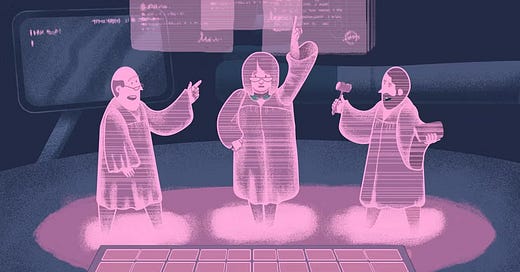My New Sci-Fi Story: "Little Assistance"
A venture into science fiction with the first judge on the Moon.
I’m very excited to announce that my new science fiction short story “Little Assistance” was published today as part of Slate’s Future Tense Fiction series.
Judge Eugene Steeples has made history as the first U.S. Special District Judge to preside on the Moon. The story follows him as he considers a difficult case that he attempts to resolve with A.I. renditions of past judges (including some familiar names). But does this new technology actually advance the cause of justice?
Before writing the story, I consulted with Timiebi “Timi” Aganaba, a space law expert and professor at Arizona State University. Aganaba helped convince me to set the story on the Moon rather than Mars, which is likely to have a far different legal system.
Special thanks to my beta readers and editors including Hannah Alvarez, Alex Cornillie, Robin Dickerhoof, Joey Eschrich, and Mia Armstrong-López.
Together with the story, Slate published a response essay from Saskia Vermeylen, a British space law expert. Vermeylen noted how “Little Assistance” continues the science fiction tradition of grappling with thorny jurisdictional issues posed by space.
As many of you know, I’m always looking for ways to write fiction that intersects with my legal career and journalism interests. That’s why I’m particularly glad to share this “case study” with you.
Read my sci-fi short story “Little Assistance”
Other things worth sharing:
Prof. Vermeylen, the response essayist, gave an interesting TED Talk about space law and its relationship with science fiction literature where she asks whether the U.S. planting its flag on the moon entails ownership.
I wrote a short article for Slate about Wikiracing, a game where players try to reach the same target Wikipedia article in the fewest possible links. From the piece—“People took Wikimania 2023’s Wikiracing very seriously, and the level of competition was incredibly high,” said Zack McCune, director of brand at the Wikimedia Foundation. “We had F1 Grand Prix energy in the room.” The Art of Wikiracing via Slate.
I’m looking forward to sci-fi author Eliot Peper’s Foundry, a suspense novel about how semiconductors are refactoring 21st century geopolitics. The book comes out Oct 11.
ChatGPT was marketed as a consumer product, but Alex Kantrowitz argues that the enterprise applications are more likely to have an impact in the short term.
Monika Sengul-Jones, author of The Gift, commented on the situation of circular referencing, AI being trained on AI, and the eyebrow raising scenarios that generates. “In that case, the metaphor I thought of is something like the hairless dog Dante, from the Disney/Pixar film, Coco, chasing its own tail, unaware what it is.”
Still thinking about Vauhini Vara’s WIRED essay Confessions of a Viral AI Writer. “Despite my success with AI-generated stories, I'm not sure they are good for writers—or writing itself," Vara writes. I’m not sure either!
Best,
Stephen



